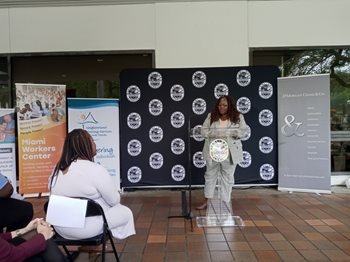An initiative led by Neighborhood Housing Services of South Florida (NHSSF) will empower Black and Latina women to create and grow their businesses – and own them. The education and financial initiative, which encourages women to form cooperatives, will focus on the care industry.
"Black and Latina women working in the informal and/or care economy should have the opportunity to grow their income and their businesses in a way that allows it to be sustainable for their families," Kimberly Henderson, NHSSF's CEO, says of the Advancing Cities Initiative, made possible by a $5 million grant from JP Morgan Chase. "We hope consumers will see there are other ways to organize our economy."
 Henderson also hopes the program will be a turning point. "I'm just excited about the possibilities. What it shows us in the nonprofit world is that we can successfully fund these types of businesses [and] encourage and expand business ownership among Black and Latina women. These innovative programs energize and catalyze our mission."
Henderson also hopes the program will be a turning point. "I'm just excited about the possibilities. What it shows us in the nonprofit world is that we can successfully fund these types of businesses [and] encourage and expand business ownership among Black and Latina women. These innovative programs energize and catalyze our mission."
NHSSF, a NeighborWorks network organization, Miami Workers Center (MWC) and Catalyst Miami will work together on the initiative. All three nonprofits are women-led and bring deep-seated subject matter expertise to the project. "It was important for us as a collaborative to work in this space as the pandemic continued and workers fell farther behind," Henderson says. According to the Economic Policy Institute, more than 90% of domestic workers nationwide are women. There are 100,000 domestic workers in South Florida alone.
Through the initiative, "we're creating a pathway for economic stability," says MWC Executive Director Santra Denis, whose center organizes Afro-Caribbean and Latina domestic workers. "We see ourselves as a power-building organization, supporting women to step into leadership and have autonomy over their lives."
Denis, whose mother worked as a caregiver, recalls her caring for others but unable to access the same care for herself. "This is an opportunity for us to shift the paradigm with care workers."
If the program works well in the region, Henderson hopes to scale up. "Women are the backbone of the economy," she says. "They're huge decision-makers when it comes to real estate and homeownership; they're driving decisions and increasingly taking care of families as heads of households." Meanwhile, the pandemic shows how dependent we are, as a nation, on the care economy, where workers in home health and child care earn an average of $13.81 and $13.51 an hour – half that of the workforce as a whole. MWC's research shows 86% of South Florida domestic workers experienced wage theft. Meanwhile, these workers have lost jobs or pay during the pandemic and have fewer protections than other industries, according to research from Murray State University.
"These women are falling behind, but they are enabling other populations to keep working because they're taking care of the children; they're taking care of older people," says Juan Carlos Gordillo, NHSSF marketing and communications manager. The cooperatives will help ensure they have more strength and support, "something they can own together," empowering individuals who have lacked advancement opportunities.
Some of the training will come through Catalyst's Worker-Owned Enterprise Program. A central component is training and financial support via NHSSF's Community Financial Development Institution (CDFI). "We'll provide the loans so they can start up the businesses," Gordillo explains. Loans will be low interest and non-extractive, meaning returns to the lender won't exceed wealth created by borrowers. NHSSF has provided residential loans before. Providing business loans will be a first. The hope, Gordillo says, is that the initiative will lead to more stability for the women and for their families, "enabling [residents] to create their own businesses and wealth."
"I am one but we are many," Melissa Laratte, domestic worker member leader and MWC board member, said through MWC. "We make all work possible in this county and in the nation but yet we are often underpaid, overlooked, harassed, experience wage theft and other forms of exploitation on and off the job." Her hope? That the initiative will build "an economy that works for us, too."
NeighborWorks network organizations like NHSSF are dedicated to working with residents in their communities to resolve issues – and to addressing the broader factors behind those issues. "We know the reality with our residents in Miami," Gordillo says. Through the initiative, they're working to make that reality a better one.
03/08/2022

